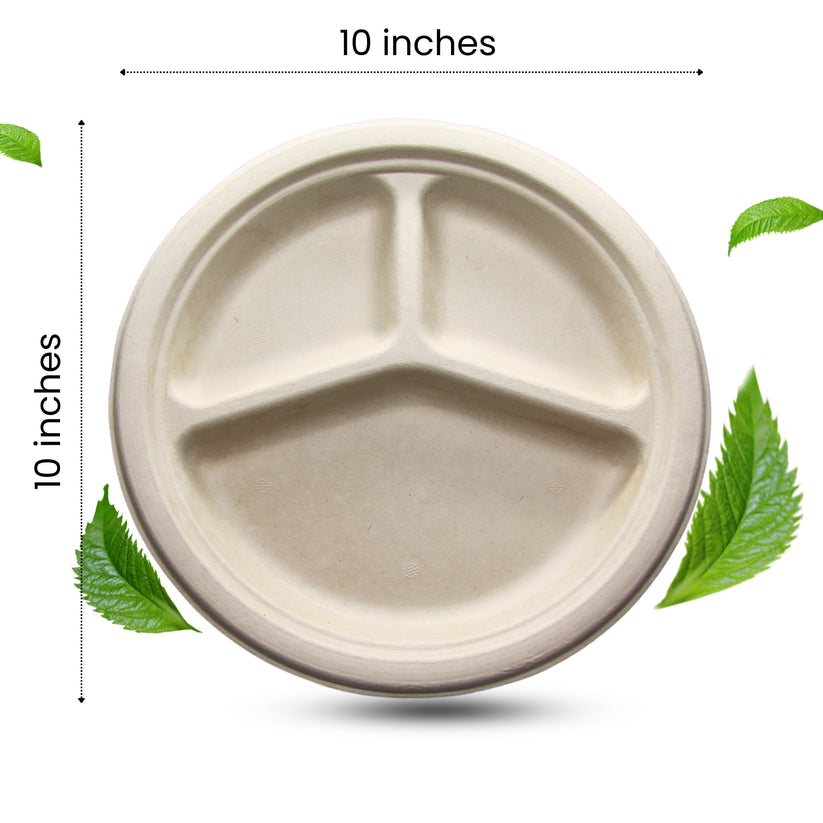Compostable vs. Disposable Plates: Making the Right Choice for a Sustainable Future
The global shift toward sustainability has driven consumers and businesses alike to rethink the materials they use in everyday life. One area that often gets overlooked but plays a significant role in environmental impact is disposable tableware. For large events, picnics, or takeout services, disposable plates are used frequently but discarded just as quickly. The choice between traditional disposable plates and compostable plates is crucial in reducing plastic waste and environmental degradation.
In this blog, we’ll explore the differences between compostable plates, biodegradable plates, and traditional disposable options, while also discussing why alternatives like bamboo plates and sugarcane bagasse plates offer a better solution for both the planet and your conscience.
The Problem with Traditional Disposable Plates
Disposable plates made from materials like plastic and Styrofoam have long been the go-to for convenience. They are cheap, lightweight, and able to handle hot or cold food. But their convenience comes at a significant environmental cost. Plastic plates are typically derived from non-renewable resources like petroleum, and their manufacturing process releases a substantial amount of carbon emissions. Worse still, these plates take hundreds, if not thousands, of years to break down, all while leaching harmful chemicals into the soil and water systems.
Compostable Plates: A Sustainable Alternative
In response to the environmental hazards posed by traditional disposables, compostable plates have emerged as a viable solution. Made from plant-based materials such as bamboo or sugarcane bagasse, compostable plates offer the convenience of disposables without the environmental drawbacks. These plates are designed to break down naturally into organic matter, leaving no harmful residues behind.
One of the key benefits of compostable plates is their ability to decompose within months under the right conditions, making them a plastic-free alternative. Unlike plastic or Styrofoam, which can take centuries to break down, compostable plates disintegrate within 90 to 180 days in a commercial composting facility. They don’t leave harmful chemicals or microplastics, contributing instead to healthy soil.
Take sugarcane bagasse plates as an example. Bagasse is the fibrous material left after the juice is extracted from sugarcane. Instead of wasting this by-product, it’s repurposed into tableware that is sturdy, heat-resistant, and entirely compostable. Another option, bamboo plates, is equally sustainable. Bamboo is a fast-growing plant that requires minimal water and no pesticides, making it a highly renewable resource. Plates made from bamboo are biodegradable, eco-friendly, and durable enough to handle even heavy or wet foods.
What About Biodegradable Plates?
Many people use the terms "biodegradable" and "compostable" interchangeably, but they are not the same. Biodegradable plates will eventually break down, but the timeline is often much longer than compostable products. More importantly, biodegradable products don’t always leave behind safe by-products when they decompose. In contrast, compostable plates are specifically designed to break down into non-toxic organic materials that can benefit the soil.
Biodegradable plates are typically made from paper or plant-based plastics (PLA), which can decompose under the right conditions. However, it's crucial to remember that even though biodegradable plates are better than traditional plastic, they might still take years to break down if not composted properly. Moreover, some biodegradable products may not fully decompose in landfill conditions due to the lack of oxygen and microorganisms necessary for the process.
The Benefits of Bulk Disposable Plates
For large events, gatherings, or restaurant use, buying bulk disposable plates is often more economical. The good news is that sustainable alternatives, such as compostable and biodegradable plates, are now available in bulk. Restaurants, catering services, and event organizers can choose compostable plates or bamboo plates disposable in bulk to reduce both costs and environmental impact. This ensures that sustainability doesn't have to come at a premium price.
Buying bulk also reduces the frequency of shipping, which in itself can contribute to a lower carbon footprint. Bulk purchases often come in more minimalistic packaging, reducing plastic and paper waste further. When you opt for bulk disposable plates made from eco-friendly materials, you’re making a significant contribution to reducing waste in your business or personal life.
Making the Right Choice: Compostable vs. Traditional Plates
Choosing between compostable plates and traditional disposable plates ultimately comes down to considering the impact you want to have on the environment. While traditional plastic or Styrofoam plates may seem like the easier or cheaper option in the short term, the long-term environmental costs are enormous. These materials contribute to pollution, greenhouse gas emissions, and harm to wildlife.
In contrast, bamboo plates are made from renewable resources and designed to break down without harming the planet. These options provide the same level of convenience and sturdiness as their plastic counterparts but with the added benefit of sustainability.
By making the switch to compostable or biodegradable plates, you are directly contributing to reducing plastic waste and supporting a circular economy. Moreover, when you choose plastic-free alternatives like bagasse plates or bamboo plates, you're helping to minimize reliance on fossil fuels and protect natural ecosystems.
Final Thoughts
The transition from traditional disposable plates to compostable plates and biodegradable plates is not just a trend - it’s a necessity for the future of our planet. Whether for large gatherings, catering services, or personal use, switching to plastic-free alternatives like bamboo plates can significantly reduce your environmental footprint. By opting for bulk disposable plates made from sustainable materials, you are making a conscious decision that benefits both you and the earth.
Now is the time to embrace sustainable choices in our everyday lives. Whether you're planning an event or running a business, choosing compostable Zero waste products and other eco-friendly disposables is a small but impactful way to support a cleaner, greener future.



Comments
Post a Comment